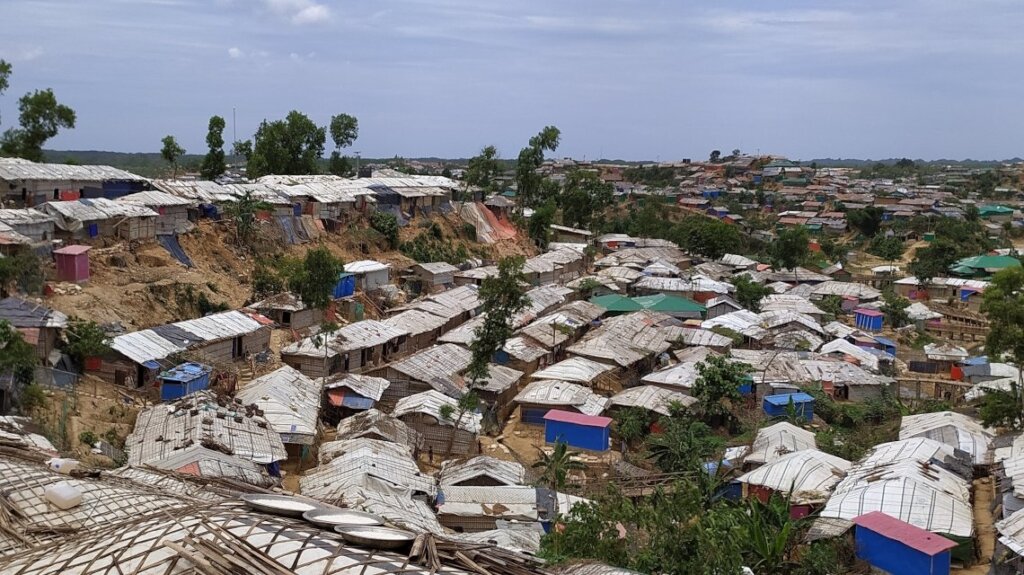By Conner Purcell | Sr Director, Business Development
The following report has been adapted from an in-depth, firsthand report and interviews conducted by Concern Worldwide’s Tony Cuddihy.
**********************************************************************************
When Nurul (*names have been changed for security) and his family fled the violence that broke out within Myanmar’s Rakhine State in 2017 and crossed the border into Bangladesh, they knew they were heading into an uncertain future.
What they could not have known, however, was that four years later they would remain in limbo, locked down in an unfamiliar country with their fellow refugees, with only the faintest hope of ever seeing their home country again. Life, already difficult before the COVID-19 pandemic, has become even tougher for Nurul, his family and the entire Rohingya population living across 34 camps in Bangladesh’s Cox’s Bazar district. The camps are now home to more than one million people, many of whom are infants and small children who have never seen the homeland of their parents. Despite leaving the burning ruins of their homes to seek shelter in Bangladesh, the Rohingya have still not found a safe and secure home.
In 2021 alone, floods, fires, violence, repeated lockdowns and increasing tensions among previously hospitable neighbours have all made life more difficult.
Since March 2021, Nurul, his son Monir, Monir’s wife Khadija and their family have been living in a makeshift tent after a massive fire destroyed more than 15,000 shelters. Fencing and barbed wire - which was finished in 2021 and surrounds the entire perimeter of the camps - blocked off potential routes of escape, and also left many injured older people and children separated from their families for days.
Khadija was herself separated from her three youngest children for two days, leaving her distraught. The fire also left tens of thousands of people without a home. Speaking to Concern under a tarpaulin held upright by bamboo sticks, Khadija’s family describes how they were told they would receive new shelters by the time monsoon season started in June 2021. However, while the rains came, delays caused by COVID-19 restrictions around the camp meant that their shelter never did.
Since the military in Myanmar seized control of the country in February 2021, the dream of a return to their homeland remains elusive to Nurul, his children, his grandchildren and the entire Rohingya community in Bangladesh. This is now a protracted crisis and hope is diminishing all the time within the Rohingya population.
"The reality is people are going to be at the camps for years,” says Concern Worldwide’s Country Director, Fiona McLysaght. “Unless there's some miracle, which is highly unlikely with what's happening now in Myanmar, people are stuck there for the longer term, so they're really stuck between a rock and a hard place... It's really, really difficult, and the camps situation is deteriorating. The population is increasing obviously every year. There are a million people in this confined area. It's very unpleasant, very troubling and a very fearful situation. What are we going to be discussing this time next year, five years on?"
Amid the uncertainty sits Nurul and his family. His greatest wish is to see his grandchildren and great-grandchildren receive an education, for them to learn essential life skills and make life within the camp that bit easier, and perhaps one day become free again.
“We want to live in safety,” he says.
By Hannah Mack | Donor Engagement Manager
By Hannah Mack | Engagement Marketing Manager
Project reports on GlobalGiving are posted directly to globalgiving.org by Project Leaders as they are completed, generally every 3-4 months. To protect the integrity of these documents, GlobalGiving does not alter them; therefore you may find some language or formatting issues.
If you donate to this project or have donated to this project, you can recieve an email when this project posts a report. You can also subscribe for reports without donating.
Support this important cause by creating a personalized fundraising page.
Start a Fundraiser